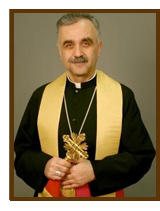American Catholic Press
16565 S. State Street, South Holland, Illinois 60473
|
||||||||||||||||||||||||
|
|
||||||||||||||||||||||||
|
by Father Robert Taft, S.J. Rome, June 6, 2006 Mar Bawai’s path-breaking 2002 doctoral dissertation represents the first modern, scholarly presentation of its own tradition by a leader of the ancient, Apostolic Assyrian Church of the East. This Church has only in recent decades been able to exit from the ghetto, into which historical circumstances had forced it, and to earn its place as a respected dialogue partner in the broader ecumenical world of Apostolic Christianity. Once published, this dissertation will be of inestimable value in the life of the Church of the East by assisting it in its own self-understanding and in communicating to its own faithful the riches of its age-old tradition, beyond the myths, in a way acceptable to modern historiography. It is impossible to exaggerate the importance of this work not only for the Church of the East itself, which by this very fact is issuing from the cave in which it has been hidden for countless centuries. It is also of seminal importance for ecumenical dialogue with the Catholic and other Orthodox Apostolic Churches, which will be forced to abandon the clichés by which they have judged the Church of the East and its age-old distinct tradition, forcing it into their own legitimate but particular and therefore limited framework. Historically, it has ever been the temptation of ecclesial communions to universalize their own particular traditions and modes of theological expression and vocabulary, and to judge everyone else by their own yardstick. This is what the Catholic and Byzantine Orthodox Churches did during the great Christological Councils of Ephesus (431), Chalcedon (451), and Constantinople II (553); and only modern scholarship and ecumenism, beyond all polemics and myths, can resolve these problems. Recent ecumenical agreements between the Catholic Church and the Church of the East have resolved the Nestorian problem of Ephesus (431) to the mutual satisfaction of both sides in the dialogue. What Mar Bawai’s scholarship has done is provide the wide-ranging historical and patristic backup for those epoch-making ecumenical agreements, placing the apostolic origins of the Assyrian Church of the East in its historical context and retracing it within its own historical framework, and not simply as an appendage to the Churches of the Roman Empire. This revisionist view of the Church of the East and its teaching as seen by itself, from within, and not as usually presented by those outside the tradition, is in full accord with the latest modern scholarship on the topic, which has one by one overturned the cliche- ridden commonplaces of the past, and will surely be recognized as the most valuable overall study of this tradition in any modern language. This is how Churches must defend and preserve their heritage in the modern world: not by defensiveness and withdrawal, hiding from others, holding them at a distance out of fear and a lack of self-confidence, but by reaching out to all in ways the modern world understands. By so doing, Mar Bawai has made his beloved Church of the East a witness to the world of today. Apostolic Christianity will survive in the eyes of the modern secular and scientific world as a viable creed and way of life only if it is studied and explained with complete historico-critical objectivity by scholars who gain the respect of that secular world. In a world that no longer cares what or if one believes, or what, if any, ecclesiastic rank one holds, this respect is gained only by the intellectual rigor of one’s scholarship. In providing his Church this kind of episcopal leadership, Mar Bawai has been an example to us all. The present difficulties are in many ways, perhaps, a ricochet of what Mar Bawai has accomplished among those more fearful of the modern realities. But in the light of his unbending loyalty to his Church and tradition and his efforts to lead them into the world of the third millennium, with God’s help these problems will pass. That is my prayer for Mar Bawai Soro, one of my dearest friends, and for his beloved Church of the East.
On January 21, 2007, Father Taft spoke at Mar Yosip Cathedral in San Jose,
California.
|
|||||||||||||||||||||||
|
||||||||||||||||||||||||

